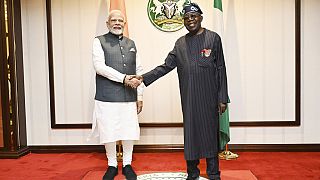Nigeria
Nigeria’s president Muhammadu Buhari has confirmed plans to remove a costly petrol subsidy as he presented Friday his final budget as leader of the west African foreseeing deep revenue shortfalls. Despite being a major oil exporter, Nigeria imports the bulk of its petrol and a subsidy keeps the prices at the pump low for consumers.
While popular with Nigerians, the subsidy is costly, with the price tag estimated at $9 billion this year. "Petrol subsidy has been a recurring and controversial public policy issue in our country since the early eighties," Buhari told a joint session of the National Assembly in Abuja on Friday. "However, its current fiscal impact has clearly shown that the policy is unsustainable," he said.
If the government goes forward with ending the subsidy it would add to the burden of Nigeria's consumers who are battling with the inflationary fallout from Russia's war in Ukraine and the end of the Covid pandemic.
Buhari presented a record budget of 20.51 trillion naira ($47.4 billion) for 2023, with spending up 18.4 percent from this year in nominal terms. But with inflation currently running at over 20 percent, and forecast at 17.16 percent for next year in the budget, there is unlikely to be much, if any change in real terms.
Buhari said Nigeria's economy is projected to grow 3.7 percent in 2023, up marginally from the 3.55 percent rate expected this year.
Nigeria's tax revenue has yet to recover from the Covid-19 pandemic, and has also been battered by the economic effects of the Ukraine war. The budget deficit is projected to be 10.78 trillion naira, said Buhari, which is just over half of planned spending.
Oil revenue is projected at 1.92 trillion naira, with non-oil taxes estimated to contribute 2.43 trillion naira, he said. Buhari said the budget expects oil-rich Nigeria will produce 1.69 million barrels per day (bpd) of crude, assumes an oil price of $70 per barrel and an exchange rate of 435.57 naira to the dollar.
Nigeria, a member of OPEC, has been unable to meet its quota of 1.8 million bpd because of a lack of production capacity and large-scale oil theft, hurting revenue and draining foreign reserves. The budget must be approved by lawmakers
Nigerians go to the polls in February to elect a successor for Buhari, 79, who will step down after leading Africa's most populous nation for eight years.
With Nigeria’s economy flagging, its vital oil production at all-time lows, and insecurity a major problem, the next president faces a host of urgent issues.












00:49
South Africa projects wider deficits and rising debt despite improved growth
Go to video
Kenya to cut spending by nearly 2% in revised budget
Go to video
Kenya: President Ruto to address the Nation
Go to video
Kenya's president warns of major fallout after $80 billion debt relief effort fails
01:03
Kenya: President Ruto proposes budget cuts after deadly protests
01:10
Kenya: Ruto says borrowing only way to plug deficit